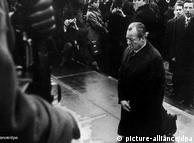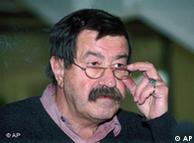LITERATURE | 19.07.2010
Poland must stop being an absolute victim, says Guenter Grass
Nobel-prize winning author Guenter Grass' works include "The Tin Drum" (1959), "My Century" (1999) and "Peeling the Onion" (2006). He spoke with Deutsche Welle about his views on Polish identity and some of the political events that have shaped his work and life.
Deutsche Welle: As a figure displaced from Poland to Germany after World War II, how do you feel about your reception in Poland? People there don't fear you; they even celebrate you and defend you against some detractors.
Guenter Grass: I'm glad about it, of course. It's a long story for someone like me from a displaced family, and it certainly wasn't easy in the time immediately following the war, when you consider the history between Germany and Poland.
My books helped introduce the generation that grew up in Danzig after the war to the history of this country - the propaganda and 1945 were like centuries ago for them. People took all of that in, and it was well received. And it also led to the fact that when I had critical things to say about Poland or about Polish nationalism, it was accepted - because people knew that I had also opened my mouth in certain circles here in Germany.
You were there in 1970 when then German Chancellor Willy Brandt fell to his knees at the Warsaw Ghetto Uprising Memorial. What was your feeling at the time, and how do you evaluate the event today?
I stood at the edge of the crowd, and I have to say that I was shocked because I immediately wondered how that would be received in Germany. And there was no shortage of derisive comments about it.
Many years later, I wrote about Brandt kneeling in my book "My Century" from the perspective of a reserve journalist at the scene, who views it partly as a kind of propaganda move on Brandt's part but also wonders how to write about it in a way that a newspaper will want it.
Those weren't my thoughts exactly, but the event certainly prompted many things. Even a lot of Polish people had a hard time grasping his motivation, and they reflected extensively on what it meant.
 Former German Chancellor Willy Brandt famously knelt before the Warsaw Ghetto Uprising Memorial
Former German Chancellor Willy Brandt famously knelt before the Warsaw Ghetto Uprising Memorial
Do you think there's a danger in terms of reinterpreting history so that Germans suddenly see themselves as victims of the World War II period?
I mean, I see the division of people into victims and perpetrators as a rather artificial affair. Germans became simultaneously the perpetrators and the victims of their politics. When I think about the young Germans who were deported, then they're of course victims of the politics that Germans provoked. Every act of displacement is a crime, and the displacement of Germans was also a crime and a terrible by-product of the period. This is a fact that you have to recognize, and distinguishing between victims and perpetrators doesn't help you there.
Mr. Grass, you were born in Danzig and have become conjoined with this city. You also have many friends in Poland. But where is your home?
Home is for me something that has been lost, but I've tried to make something positive out of that experience. For me, literature offers that possibility - provided you pursue it with a certain obsessiveness.
Danzig's history is one of destruction and of revivification and of remembrance. After writing "The Tin Drum," I returned again and again to Danzig to find traces of the city there. Then the phase of rebuilding and the first signs of unrest in the 70s, and the workers' revolt - all of that found its way into my writing. In that sense, I have been a contemporary of Poland's, like I have been in Germany.
Recently, Bronislaw Komorowski beat Jaroslaw Kaczynski in Poland's presidential election. What do you think of the result?
It's a big relief for me - that is the future of Poland. The country has to stop being an absolute victim. There is a young generation that will play an important role in Europe, and I am convinced that the new president represents that well.
Interview: Barbara Coellen (gsw)
Editor: Kate Bowen


No comments:
Post a Comment